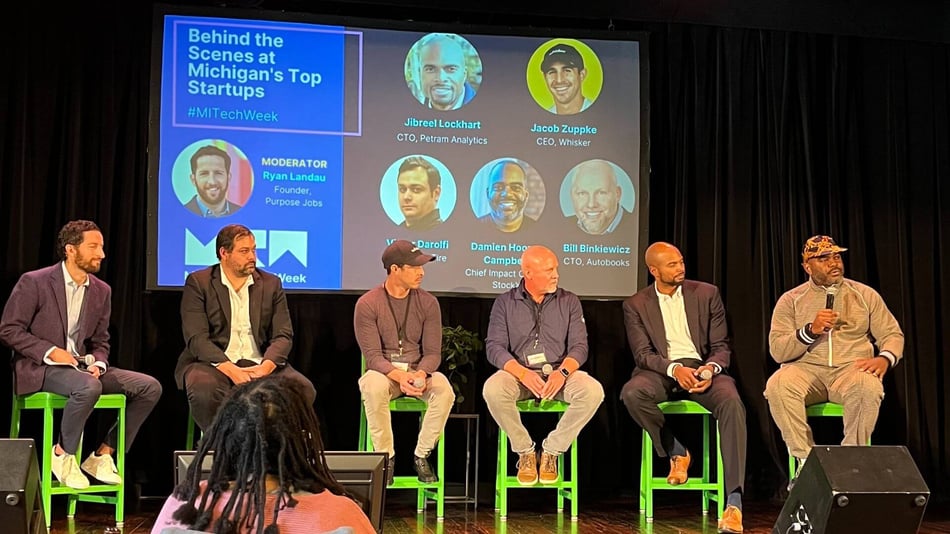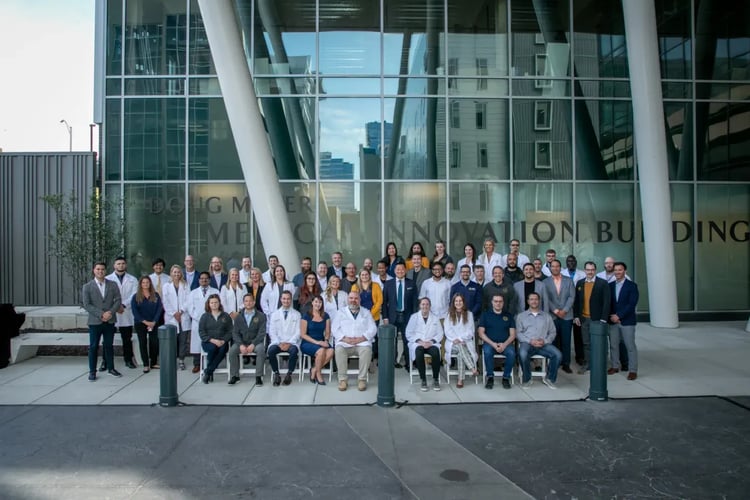And more insights from Michigan Tech Week
From all across the state of Michigan, startup founders, tech leaders, students, job seekers and technologists gathered at the Gem Theater in Detroit for the inaugural Michigan Tech Week.
Put on by the Michigan Founders Fund, Intermitten, Start Garden and so many more partners, the two-day event highlighted the growth of the Michigan startup and tech ecosystem.
We were pumped to be a part of the event and host a panel: “Behind the Scenes at Michigan’s Top Startups.”
.jpg?width=1920&name=michigan%20tech%20week%20(1).jpg)
Our founder and CEO, Ryan, chatted with five startup and tech leaders all about hiring, remote/hybrid work, the Michigan tech ecosystem and what’s next for the community and these companies.
Missed the event? No worries. Here are some takeaways from the panelists.
1. Covid proved software engineering could be done remotely. Now the challenge is figuring out hybrid work.
Bill Binkiewicz, the CTO of Autobooks, called out how the last two years have shown that so much of tech can be done remotely. Which is great for finding and retaining top talent who want to have flexibility, or people who align with the mission but don’t live near the office.
But, as Bill immediately pointed out when he looked out into the audience, sometimes it feels so good to bring people together. It’s so important to bring communities together and have that human connection.
For Whisker, a company based in Detroit but with remote flexibility and manufacturing in Wisconsin, they’re trying to figure out the best cadence for remote or hybrid work. Jacob Zuppke, CEO of Whisker, said the company has remained very intentional about maintaining their hybrid work culture.
2. Founders and tech executives are choosing Michigan
The panel featured two boomerang CEOs and a new Detroit resident. Jibreel Lockhart, CEO of Petram Analytics, and Victor Darolfi, CEO of RoboTire, are two tech founders who grew up in the area, left for awhile and then returned to grow their companies in Southeast Michigan. Jibreel pointed out that since 2019, 22% of professionals have moved over 100 miles from their original location. And a big factor in choosing a new location has been quality of life — cost of living, raising a family, being closer to your community… This is something Victor felt out in the Bay Area, too, that it wasn’t sustainable for his family, and so he decided to return home.
Damien Hooper-Campbell, StockX’s first-ever Chief Impact Officer, recently moved to Detroit about five months ago. He moved for this role at StockX, and said that once he visited Detroit and got to see what it’s really like here, he wanted to be a part of it.
“I’m in love with this city. I’ll show my friends pictures of things going on in Detroit, and they’re like, ‘that’s Detroit?!’ Yes, that’s Detroit,” Damien said.
3. To take Michigan to the next level, we need to advance regional VC funding and early education
Okay, so we love Detroit and the other startup ecosystems burgeoning in Michigan (we’re looking at you Ann Arbor and Grand Rapids…). But of course, there’s always room for improvement. The panelists chimed in on what would take Michigan’s ecosystems to the next level.
Victor called out the need for more venture capital activity. Coming from the Bay Area, Victor has really noticed the difference between VC activity there and in Michigan.
“We need more venture dollars in the Midwest to support founders, and we need more accelerators, too. If you want to build a culture of startups, it has to start with universities and their accelerator programs,” Victor said.
Jibreel also commented on the need for education, but from a different perspective. To really make this a desirable region for people, we need to invest in early education for kids, Jibreel said. This helps parents who are trying to decide to move here for a tech career, and it also strengthens the region’s talent pipeline.
Bill, who lives in Brighton, about an hour outside of downtown Detroit where Autobooks is located, said he’d love to see a train to help with commute times. If you’re curious why Detroit does not have a major public transit system, here’s a little history about public transportation in the area.
4. How we define success is changing — for the better
The pandemic has brought about many changes for the tech industry, and one of the biggest things in the realm of work is the shift in priorities that happened for so many of us. That’s happening at an executive level, too. For many, success doesn’t mean raising the most money or hiring rapidly for the sake of growth.
For Bill and the Autobooks team, the success of the company is the success of their customers: small businesses. He also noted that small businesses did not stop during the pandemic. They’re much more resilient than we think, which is a good perspective on the shifting market that’s currently happening.
At RoboTire, success is all about employee growth. Victor is laser focused on bringing talented folks into the startup and tech community in Michigan and helping them grow their careers.
“Success is all about helping Detroit become a top startup hub and helping people be successful here,” Victor said.
For Whisker, which has never raised venture capital and is proud to be a profitable company, success looks a little different than the late-stage startups aiming to be unicorns before debuting on the stock market. Jacob said that success at Whisker is all about working within their own means and steadily growing. Since 2019, Whisker has gone from 95 employees to 375.
“Being profitable has really kept us grounded during rapid growth,” Jacob said.
For Damien and the StockX team, success is all about the people.
“Of course revenue generation and amazing products and customer service are part of success, but that’s all possible because of our people,” Damien said.
It’s about figuring out what company culture even means in this day and age, and supporting employees. It’s also about spreading the word in Detroit and really showing up in Detroit. And finding hustlers who love a challenge to come work for them.
5. Finding talent that connects with purpose is key
As the tech industry only gets bigger, the competition for tech talent is tighter than ever. Yes, there are more people working in the industry, but the growth in jobs is outpacing the talent. So how do you find the right candidates?
At Petram Analytics, where the team is hiring remotely, finding candidates that connect with the organization’s purpose is all the more important. Job seekers have so many options when it comes to tech jobs, so finding the right people is all about finding folks who align with the mission.
6. Don’t chase money. Chase fun.
Bill shared this last piece of advice for anyone trying to break into tech: “Don’t chase money. Chase fun.”
When you’re working on things that excite you or are meaningful to you, you’ll end up like Bill, thinking to yourself: “I’m so lucky. I feel like I haven’t worked a day in my life.”
These companies are hiring! Join the Purpose Jobs community to learn more about the companies’ cultures and easily apply with one application.











